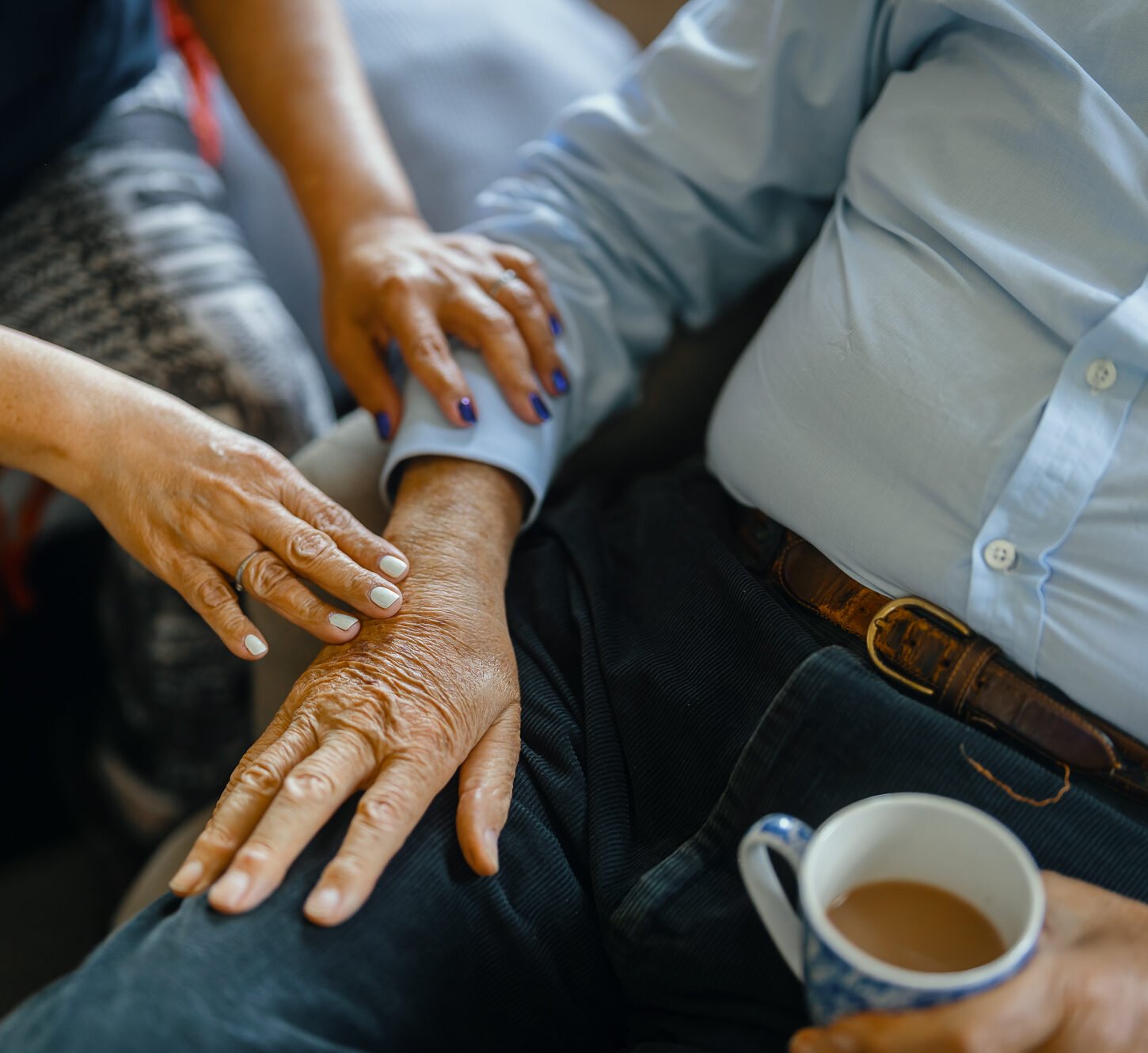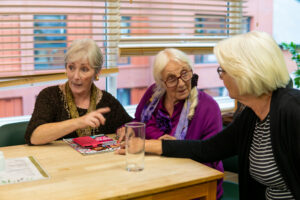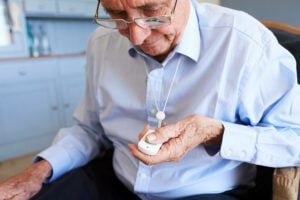Dealing with a dementia diagnosis
Tags
Living with Dementia
There’s no right or wrong way to feel about a dementia diagnosis, and you’ll likely have a lot to think about. The important thing to realise is that you’re not alone. Following a diagnosis, your GP or local authority will work with you to create a care plan – detailing the care and support services you’ll need to remain independent or look after a loved one. There’s a lot of free support out there too, from charities and online support groups to day centres and memory cafes. we’ll run through all of this below.
Expect a range of emotions
Everyone reacts differently to the knowledge that they’ll have dementia for the rest of their life, and there is no right or wrong way to behave.
It may take a few days for everything to feel ‘real’. You may have heard medical terms or jargon you’d not heard before and it may take some time for you to take everything in and understand exactly what it means for the future.
If you feel angry or upset, that’s okay. Some people may have a sense of sadness, loss or loneliness. For others, there may be a sense of relief as they can finally understand why they’ve been experiencing disorientating symptoms like memory loss. Everyone is different and how you feel can change from day to day.
If you’re supporting a person with dementia through a diagnosis, it’s important to give them plenty of time and space to process and voice how they’re feeling in their own way. They may not be ready to talk about the diagnosis straight away. The Alzheimer’s Society recommends –
- If they do have worries, don’t dismiss them – listen and show them that you are there
- Try to enjoy the moment when you can. Speculating about the future soon after a diagnosis often isn’t helpful.
There are likely to be questions. Make a note of any questions you don’t have the answers to so that you can seek the right advice further down the line.
It can also be helpful if they write down any worries, fears and uncertainties. Some people find it helpful to keep a journal they can refer back to, or use to express their feelings.
You’re not alone
- There are around 900,000 people in the UK who are living with a type of dementia. And it’s estimated one in three of us will be affected by dementia in our lifetime – either by being diagnosed with it ourselves or by caring for a loved one.
- Alzheimer’s disease affects around six in every 10 people in the UK with dementia
- 180,000 people with dementia have vascular dementia
What to say to someone who has been diagnosed with dementia
We understand that it can be hard to know what to say to someone who has just been diagnosed with dementia. You may worry about upsetting the person or making unhelpful comments. Here are some ideas of the things you could say –
“How are you feeling?”
Including individuals with dementia in conversations and asking them about their emotions and thoughts acknowledges that you still believe their thoughts and feelings are important, and keeps them feeling like independent individuals.
“I’m here for you.”
If the person with a dementia diagnosis doesn’t want to respond to “How are you feeling?” Don’t force them to talk about their feelings – they may need time. But you can still tell them you’re there for them when they want to talk and offer comfort.
“I know this is hard.”
Put yourself in their shoes – they may be frightened, confused and feeling awful. By acknowledging that a dementia diagnosis is a challenging experience, you can help them feel that they’re not having an entirely subjective experience and are not alone. Knowing this can help them gradually start exploring options for help and support in their daily life.
How to offer support to someone after a dementia diagnosis
Wendy Mitchell was diagnosed with dementia at the age of 58. She shared the following tips with the Alzheimer’s Society, on how to support and empower people living with the condition –
- Don’t jump in and do things for them – offer your help, or help them discover an easier way
- Keep a positive attitude – while things will change, it doesn’t mean the end of laughter and adventures
- Remember the things they love – hobbies, interests and passions still remain after a diagnosis
What Dementia Has Taught Wendy Mitchell: Why She is No Longer Afraid
We talked to Wendy Mitchell about how her dementia has changed her sense of self, the power of peer support and why she’s still up for a new challenge.
Free dementia support services
You’ll find plenty of free support available online and in your local area, but you may need to seek it out. The first port of call should be your GP, who may be the source of the original diagnosis. They’ll usually have a bank of further information and be able to recommend any local support services and groups that may be helpful.
If you or a loved one has received their diagnosis through a memory clinic, staff should ensure you’re provided with links to support groups and local organisations that can offer help.
Charities
Organisations such as Alzheimer’s Society and Age UK can supply detailed information about dementia and point you toward support groups. Dementia UK also has a free online resource centre full of useful guides on everything from the best books about dementia to seeking financial and legal advice. These charities will also be able to advise you of any local schemes that your loved one may benefit from, such as local dementia cafes or sensory walks. Dementia cafes provide a safe space to discuss feelings, learn new things, and take part in meaningful activities such as crafting to support self-expression. You can find local cafes here.
You’ll find opportunities to meet up with other people with dementia, as well as carer support services. Day centres, in particular, are designed to offer loved ones stimulating activities in a warm, welcoming environment and can provide you with an opportunity for respite.
Online forums
As we’ve covered, people with dementia cope in different ways, and sometimes they may feel more comfortable talking about their diagnosis with people they don’t know. Connecting with other people who have recently been diagnosed or are living with early-stage dementia can be particularly helpful, as it can reassure your relative that they’re not alone.
Alzheimer’s Society’s Dementia Support Forum, is an online community where people can read others’ experiences, ask questions and learn more about what to do next.
Professional care and support for dementia
Life with dementia will of course be different and a person is likely to need some help with their regular daily activities at some stage.
Your or your loved one’s doctor may offer a referral to the local social services department to assess needs. If this is not automatically offered, you can arrange one by contacting the local council offices and asking for contact details for the social services department.
A needs assessment will identify areas in which help is required – looking at aspects of daily life that have become difficult, as well as any potentially dangerous situations – i.e cooking meals or navigating stairs. They’ll make recommendations for any changes that should be made to the home to make it more dementia friendly. You or your loved one may also be offered a budget to cover some or all of the care and support needs, and this can be spent on social care services or put towards private care if you’d prefer.
Anyone is entitled to a needs assessment, and there’s no charge for the service. Once it’s confirmed that your loved one should receive care and support, they’ll be asked to complete a financial assessment to determine how much they’ll pay for their care. You can find out more about different types of care funding here.
How does dementia diagnosis affect family and friends?
A dementia diagnosis can significantly affect the emotions of the person themselves, family and friends. Some people may experience disbelief, anxiety, depression and hopelessness, amongst many other feelings.
Family and friends may have difficulty accepting a dementia diagnosis and the changes it can bring, particularly if the person’s symptoms of dementia don’t align with their understanding of how dementia typically presents, or if the person is younger. A diagnosis of young onset dementia can present unique challenges and give rise to concerns regarding the individual’s ability to maintain employment, financial implications for the family, and the impact on their children or teenagers.
Friends and family may experience distress and grief as they observe changes in a person during the early stages of dementia and reflect on the life they had anticipated sharing with them. Some individuals may conceal their emotions to prevent causing distress to their loved one with dementia.
There may be differing opinions among family, friends and the person diagnosed, creating challenging situations regarding important decisions or coping strategies, leading to additional distress and rising tensions. If you’re worried about having difficult conversations, we’ve shared some expert guidance here.

Thinking about the future
A diagnosis of dementia can bring about thoughts of the future. If you have strong feelings about how you want to be cared for or supported in the future, it may be a good time to start thinking about putting together an Advance Statement. This allows friends, family and carers to get to know everything that’s important to you and your daily living. You can include your likes and dislikes, what television programmes you like to watch, the foods you like best, the types of outings you enjoy, and who you want to spend your time with. An advance statement can help you maintain a sense of control over your future care.
You may also want to consider how to make your home dementia friendly, and whether you’ll need to make any further adaptations in the future if you choose to stay living there for as long as possible. This may include things like re-painting walls and doors in certain colours to create more contrast and make navigating the home easier.
Support if you’re caring for someone with dementia
Individuals who provide long-term care for someone with dementia often require support. Research suggests that informal carers who receive limited support are more prone to experiencing stress and depression.
If you lack support from friends or family, alternative options are available. This section provides an overview of various forms of assistance, acknowledging that not all types of support are suitable for everyone. Additionally, it’s important to recognise that different situations may require additional help and support.
There are various individuals and organisations available for in-person support, as well as online services to consider. Some examples include:
- GPs, memory clinic staff, and other health professionals can offer support and guidance on medical matters. They may refer you to an occupational therapist or connect you with local carers organisations that offer training on lifting techniques.
- Local social services departments can provide information on registering as a carer and arrange carer’s assessments. The GP can also assist with this.
- You can find local support groups in your area, such as the Alzheimer’s Society office, Age UK, Carer’s Trust, and Carers UK. These groups can provide information on available support and how to access it. Talking to other carers at these groups can be helpful as they understand what you’re going through. You can share ideas, strategies, and advice about caring. To find local support groups, contact the Alzheimer’s Society or Carers UK, or use our online dementia directory.
- Online discussion forums are a valuable resource for practical suggestions and a place to vent after a tough day. You can join these forums anytime, including Alzheimer’s Society’s free 24/7 online community called Talking Point. Carers UK also hosts multiple forums.
- Talking therapies, such as cognitive behavioural therapy (CBT) and counselling, can support carers experiencing anxiety or depression. These therapies offer a non-judgmental and nurturing environment where individuals can freely express their emotions. There’s a wide range of talking therapies available to choose from. Again speaking to your GP about how you’re feeling is a good place to start.
- Respite Care is a temporary care that allows carers to take a break. Allowing someone else to take over care duties for a short period – a few hours or days. Being a home carer for a loved one may feel like the best thing to do, but it can sometimes be physically and mentally challenging. Regular breaks are highly encouraged to help you look after your health.
Live-in Care
A dementia diagnosis doesn’t always mean you have to move into a care home. Care at home, provided by Elder, is growing in popularity, as it enables older and vulnerable people to remain in their home’s safe and familiar surroundings, even when they can no longer live alone, so they can still retain a good quality of life.
Live-in care means that a dedicated and empathetic carer moves into the home and lives alongside the person they’re caring for, providing a range of services that allow them to continue to enjoy an independent everyday life without the disruption that a change of address would bring.
You can source 24/7 caregivers to provide everything from simple companionship care to the complex demands of dementia care, where the carer may perform a range of personal duties, such as helping with bathing and dressing, reminding about medication and appointments, and supporting mobility.
Understand that it takes time to come to terms with the range of emotions and questions that a diagnosis of dementia brings, but rest assured that it doesn’t mean that you or a loved one can’t still live a full and active life.
Read more care guides

How to prepare for a live-in caregiver
Care at home: how to prepare the home for a live-in caregiver A live-in carer can make a massive difference to your loved one’s quality

6 tips for finding the right live-in carer
Finding the right live-in carer is a significant and deeply personal decision, impacting your loved one and the entire family. You’re seeking someone trustworthy, compassionate,

The cost of care – everything you need to know
The true cost of care – everything you need to know Discover the true cost of care and explore your funding options with our care

Understanding autism in older adults
While Autism is usually diagnosed in childhood, an increasing number of older adults are being formally diagnosed in later life. Masking autism symptoms can result

A guide to speaking with a loved one about home care
Why do older adults resist care? A guide to speaking with a loved one about home care Bringing up the topic of care at home

How to choose the right personal alarm for seniors: A comprehensive guide
Personal alarms for elderly Discover how personal alarms work, who they’re best suited to, and how they provide greater peace of mind to older people